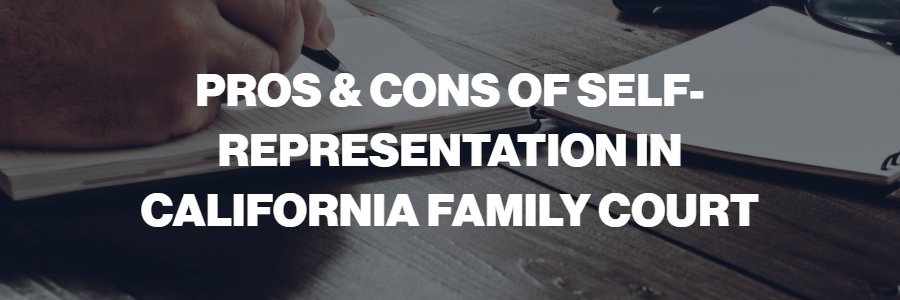It is common to look for ways to save money during a family court case, such as a divorce. Deciding to represent yourself rather than hire an attorney, however, can cost you more than you think. Self-representation may save money in short-term legal fees, but cost you the case. Without an attorney, you may lose your case – plus have to pay for the other party’s legal fees. If you are not a family lawyer, it is in your best interest to hire a professional.
Should I Represent Myself in Family Court?
The law in California does not require you to hire an attorney for a family court case. You have every right to represent yourself (pro se legal representation). Just because you are legally allowed to do something, however, does not necessarily make it a good idea. Self-representation can expose you to critical mistakes that cost you the case in the long run.
Proceeding pro se can compromise your case, increasing the odds of you losing. This is especially true if the other party involved in the case, such as your ex-spouse in a divorce case, has hired an attorney. Going up against an attorney yourself is not an even match; the attorney will have unique experience, skills and resources that you do not. This can make it more likely that the court will dismiss your case or the other party will win.
Although you might save money on attorney’s fees, you could lose even more with an unsuccessful case. A judge may order you to pay for the other side’s legal fees if you are the one who brought the case. Instead of choosing to represent yourself in the family court, look for less risky ways to save money, such as alternative dispute resolution.
Alternative dispute resolution, or ADR, is a type of conflict resolution that does not involve a courtroom trial. It refers to mediation or arbitration – private meetings between you, the defendant, your attorneys (if desired), and an arbitrator or mediator. ADR encourages you and the defendant to come to a settlement agreement and resolve your case without having to go to court. Successful ADR can save you money in court costs while still allowing you to reap the benefits of professional legal representation.
What Can Potentially Happen If I Represent Myself in Family Court?
There is a lot at stake if you choose to represent yourself in the family court. The specifics depend on the unique elements of your case. In a divorce case, for example, you could be at risk of losing custody of your children. Depending on how much you are at risk of losing in your case, you may not wish to handle it on your own.
Although there are both pros and cons of self-representation in the family courts, the cons significantly outweigh the pros. Unless you are an attorney, it is generally in your best interest not to represent yourself.
Pros:
- Save money on attorney’s fees if you win the case
- You are in charge of your own case
Cons:
- Having to deal with the labor and time that goes into legal action on your own
- The risk of not meeting all of the elements required to prove your case
- Missing your filing deadline and losing the right to file
- The courts may view you as biased
- Being unfamiliar with the laws related to your case
- Going up against the other party’s attorney unrepresented
- Higher odds of losing your case
- Having to pay the other side’s legal fees if you lose
Self-representation places you at a much higher risk of losing your case and paying for the other side’s attorney, rather than simply paying for your own attorney to represent you. Choosing to represent yourself in family court may not save you as much money as you think – and could even cost you more than hiring an attorney would have.
If you are not sure whether your case requires legal representation, schedule a free consultation to discuss your family law matter with an attorney in San Diego.





